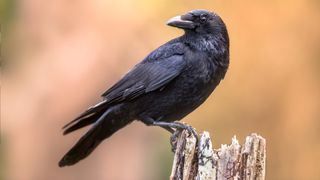Crows can count out loud, startling study reveals
This is the first time an animal other than humans has been seen performing the feat of vocal numeracy.

Crows can count out loud, a startling new study has revealed, and they may even have the same numeracy skills as human toddlers.
Researchers found that carrion crows (Corvus corone) can produce a specific number of caws in response to visual or auditory stimuli, enabling them to count out loud between one and four.
The discovery is the first time that animals have been definitively shown to count by making a distinct number of vocalizations. The researchers published their findings Thursday (May 23) in the journal Science.
"Producing a specific number of vocalizations with purpose requires a sophisticated combination of numerical abilities and vocal control," the researchers wrote in the study. "Our results demonstrate that crows can flexibly and deliberately produce an instructed number of vocalizations by using the 'approximate number system', a non-symbolic number estimation system shared by humans and animals."
Many studies have shown that animals, including honeybees, lions, frogs and ants, have an inherent numerical sense, and another study revealed that black-capped chickadees (Poecile atricapillus) add more "dee'"trills at the end of their alarm calls to alert to more significant threats. Yet none of these provide enough evidence that animals share humans' ability to count out loud — for instance, in the example of the chickadees, the birds may only be calling more frequently as a result of heightened stress.
Related: Crows outthink monkeys, can grasp recursive patterns
To look for stronger evidence of vocal animal counting, the researchers turned to carrion crows, a promising candidate for the test due to their superb vocal abilities and comprehension of complex mathematical concepts such as zero.
Sign up for the Live Science daily newsletter now
Get the world’s most fascinating discoveries delivered straight to your inbox.
In the new study, the researchers presented three crows with randomly ordered visual and auditory stimuli — the visual being arabic numbers and the auditory cue being the sounds of different instruments.
Through trial and error, the birds learned that each cue corresponded to a set number of caws between one and four. After crowing the vocalizations out (cawing four times for a sound or symbol associated with four caws, for example), the birds were trained to peck the screen displaying them to signal they had finished. If the crows gave the right number of caws corresponding to the prompt, they were rewarded with a treat.
Once they were trained, the counting crows gave accurate responses — producing the correct number of caws to the prompts at a rate higher than chance. Even when the crows gave wrong responses, they were often mistakes made between numbers that were relatively close together (such as three and four) rather than further apart (like one and four).
The researchers say that the birds' counting skills are like those of human toddlers, who often count based upon vocalizations of numbers rather than using numbers themselves.
"This competency in crows also mirrors toddlers' enumeration skills before they learn to understand cardinal number words and may therefore constitute an evolutionary precursor of true counting where numbers are part of a combinatorial symbol system," the scientists wrote.

Ben Turner is a U.K. based staff writer at Live Science. He covers physics and astronomy, among other topics like tech and climate change. He graduated from University College London with a degree in particle physics before training as a journalist. When he's not writing, Ben enjoys reading literature, playing the guitar and embarrassing himself with chess.